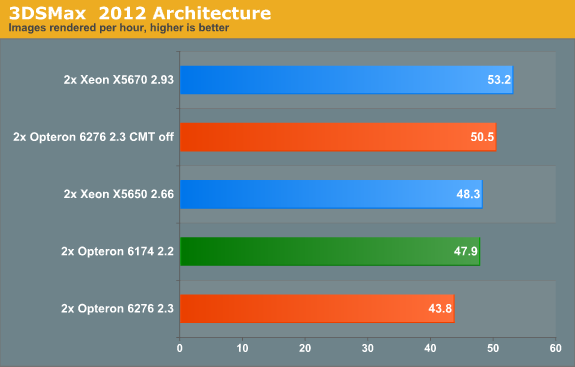Bulldozer for Servers: Testing AMD's "Interlagos" Opteron 6200 Series
by Johan De Gelas on November 15, 2011 5:09 PM ESTRendering Performance: 3DSMax 2012
As requested, we're reintroducing our 3DS Max benchmark. We used the "architecture" scene which is included in the SPEC APC 3DS Max test. As the Scanline renderer is limited to 16 threads, we chose the iray render engine, which is basically an automatically configuring Mental Ray render engine. Note that these numbers are in no way comparable to the ones we have obtained before as those were all performed with the scanline render engine!

We rendered at 720p (1280x720) resolution. We measured the time it takes to render 10 frames (from 20 to 29) with SSE enabled. We recorded the time and then calculated (3600 seconds * 10 frames / time recorded) how many frames a certain CPU configuration could render in one hour. All results are reported as rendered images per hour; higher is thus better. We used the 64-bit version of 3ds Max 2008 on 64-bit Windows 2008 R2 SP1.

Something really weird happened here: once we disable CMT, the Opteron 6276 performs much better. Rendering performance is quite good as the Opteron 6276 beats the Xeon X5650.










106 Comments
View All Comments
mino - Wednesday, November 16, 2011 - link
IT had most likely to do with you running it on NetBurst (judging by no VT-X moniker).As much to do with VT-X as with a crappy CPU ... wiht bus architecture ah, thank god they are dead.
JustTheFacts - Wednesday, November 16, 2011 - link
Please explain why there is no comparison between the latest AMD processors to Intel's flagship two-way server processors: the Intel Westmere-EX e7-28xx processor family?Lest you forgot about them, you can find your own benchmarks of this flagship Intel processor here: http://www.anandtech.com/show/4285/westmereex-inte...
Take the gloves off and compare flagship against flagship please, and then scale the results to reflect the price differece if you have to, but there's no good reason not to compare them that I can see. Thanks.
duploxxx - Thursday, November 17, 2011 - link
Westmere EX 2sockets is dead, will be killed by own intel platform called romley which will have 2p and 4p.it was a stupid platform from the start and overrated by sales/consultants with there so called huge memory support.
aka_Warlock - Wednesday, November 16, 2011 - link
I think you should have done a more thorough VM test than you did. 64GB RAM?We all know single threaded performance is weak, but I still feel the server are underutilized in your test.
These CPU's are screaming heavy multi threading workloads. Many VM's. Many vCPU's.
What would the performance be if you had, say, at least 192GB of RAM and 50 (maybe more) VM's on it?
And offcourse, storage should not be a bottleneck.
I think this is where his 8modules/16threads cpu would shine.
A dual socket rack/blade. 16modules/32 threads.
Loads of RAM and a bounch of VM's.
iwod - Wednesday, November 16, 2011 - link
It is power hungry, isn't any better then Intel, and it is only slightly cheaper, at the cost of higher electricity bill.So unless with some software optimization that magically show AMD is good at something, i think they are pretty much doomed.
It is like Pentium 4, except Intel can afford making one or two mistakes, but not with AMD.
mino - Wednesday, November 16, 2011 - link
Then the article served its purpose well.SunLord - Wednesday, November 16, 2011 - link
So is the AMD system running 8GB DDR3-1600 DIMMS or 4GB DDR3-1333? Because you list the same DDR3-1333 model for both systems and if the Server supports 16 DIMMs well 16*4 is 64GBJohanAnandtech - Thursday, November 17, 2011 - link
Copy and paste error, Fixed. We used DDR-3 1600 (Samsung)Johnmcl7 - Wednesday, November 16, 2011 - link
I have wondered about this, with more cores per socket and virtualisation (organising new set of servers and buying far less hardware for the same functionality) so I'd have thought in total less server hardware is being purchased. Clearly that isn't the case though, is the money made back from more expensive servers?John
bruce24 - Wednesday, November 16, 2011 - link
While sure which each new generation of server you need much less hardware to do the same amount of work, however worldwide people are looking for servers to do much more work. Each year companies like Google, Facebook, Amazon, Microsoft and Apple add much more computing power than they could get by refreshing their current servers.